Bahati paving the way
"No-one likes us, we don't care." For anyone who's not au fait with London soccer clubs, that's the...
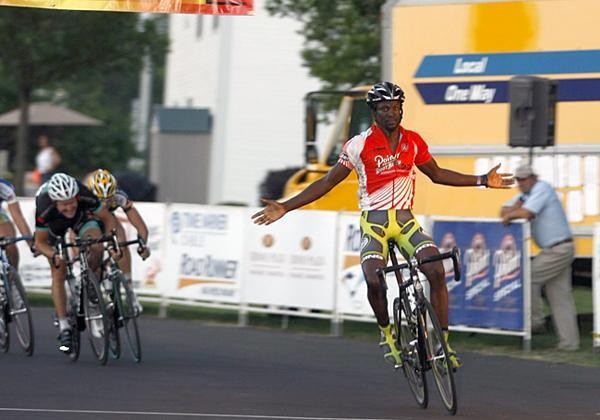
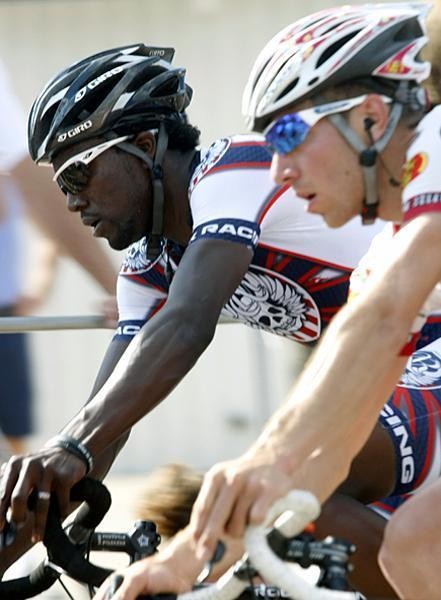
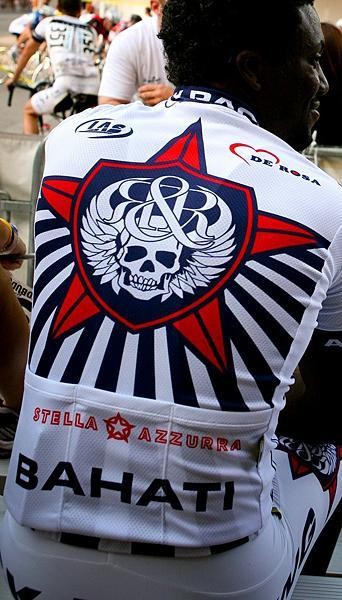
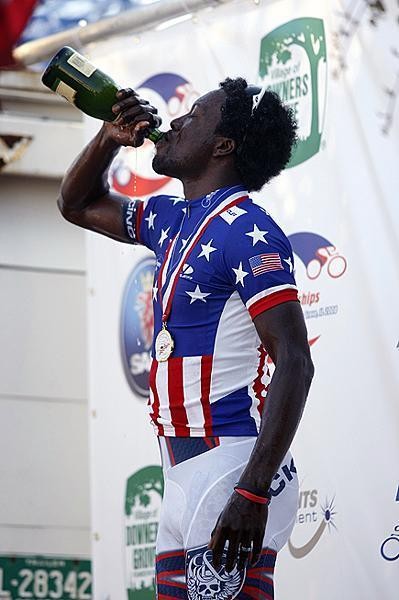
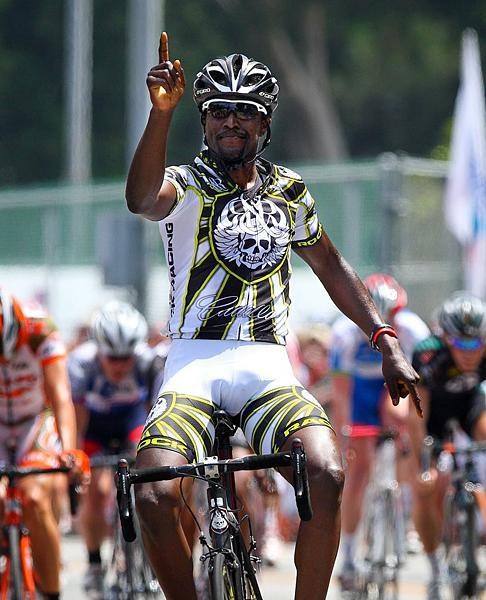
News feature, October 14, 2008
"No-one likes us, we don't care." For anyone who's not au fait with London soccer clubs, that's the unofficial creed of Millwall FC, a lower league team that punches above its weight in terms of the headlines it's grabbed over the years – mostly negative. That motto could just as well apply to cycling's own Rock Racing. The US-based Continental outfit certainly provoked plenty of column inches, most of them outraged, when its participation in the 2008 Tour of Britain was announced.
Whatever you make of owner Michael Ball's employment of Tyler Hamilton, Oscar Sevilla and Santiago Botero, you can't deny the fact that his team gets noticed. One thing that stood out about the Rock line-up at this year's Tour of Britain, though, was that it included the event's first black rider, Rahsaan Bahati. Some are struck by the lack of racial diversity in the pro peloton. Of course, many know about Marhsall 'Major' Taylor's story over a hundred years ago, but it seems like things haven't moved on a great deal since then.
Taylor, for those unfamiliar with his exploits, was the fastest man on two wheels at the turn of the last century. Dominant on the track, he broke seven world records in one year alone. 1899 may have been a fine year for records in the velodrome, but it wasn't for racial harmony. Despite his ability to draw huge crowds and the invitations he received to race as far afield as Europe and Australia, Taylor was the victim of terrible prejudice and dirty tricks, sometimes even physical violence, from his white peers on the track.
He rose above it with great dignity and he arguably paved the way for other African Americans to break into professional sports. However, I've racked my brains to come up with the names of more black cyclists who've made it big since Major Taylor. I can think of a mere handful. I know of Maurice Burton, who carved out a decent career as a Six Day rider in Belgium. I remember Yohann Gene riding in the Giro d'Italia for Bouygues Telecom a couple of years ago, and I know Jean Rene Bernaudeau has another black rider on his books at Bouygues - Ronny Martias. And of course there's the superb French trackie Gregory Bauge. Can I think of any more? Not really, I'm struggling.
But there is Bahati, the 26-year-old Californian who had been talked up by Ball in the weeks before the Tour of Britain as quicker than Mark Cavendish over shorter distances. As it was, that sprint duel would have to wait for another time because the Manx Express had been sent Stateside by Team Columbia to headline the Tour of Missouri.
Bahati himself has had a good year, the crowning achievement being his victory in the US National Criterium Championships. Maybe packing early in the Tour of Britain had dented his morale a bit because Bahati seemed slightly lost for words when asked about his boss's bold pronouncements. Pressed about his opinion on Cavendish, he admitted to keeping tabs on the young Briton, being a fan even. But Bahati got hooked on cycling at a young age by sprinting legend Mario Cipollini. Bahati revealed he studied the stylish Italian's victories on video over and over again.
The latest race content, interviews, features, reviews and expert buying guides, direct to your inbox!
Starting out embarrassed
Bahati's own entry into the sport was nothing if not unorthodox. Coming from the tough Los Angeles neighbourhood of Compton, where basketball and baseball were king, he used to ride over to the velodrome at Carson and jump the fence to ride a few laps for fun. Eventually he was noticed and the first inkling that he had something special in him came when aged 13 he beat a 19-year-old national champion in a scratch race. By then he was a member of local club Major Motion, named after Marshall Taylor, Bahati's other cycling hero.
Despite his enthusiasm and his talent, Bahati explained how it wasn't always easy being a young cyclist from his neck of the woods. "When I started I was embarrassed about what I had to wear, the outfit, the helmet, the shoes and all that," but he said that the jibes about garish lycra were eventually put aside at high school. "Kids looked up to me because I got a chance to travel and to do something they would never ever do."
Even so, his first forays on European soil were eye opening, cringe-worthy even. "When I first raced there as a junior it was very shocking to me. I had people after the race wanting to touch my hair, touch my skin. There are black people in Belgium and Germany but none really in bike racing." He's glad he took those slightly surreal experiences on the chin because he acknowledged that getting angry might have backfired on him. A sense of humour was his friend – "it's kind of hard to miss me when I'm here. I was always telling people I look like a raisin in milk."
Bahati gave it some thought on why there aren't more black cyclists. Expense is certainly a factor that comes up but not, he said, an insurmountable barrier. Whatever one might think about Ball and Rock Racing, Bahati is quick to point out that just as certain riders on the team have been given what he calls a second chance, others have been given a big hand up the ladder by the sponsor, filling a void left by cycling's own authorities.
Asked if he thinks the powers-that-be do enough to help ethnic minorities and under-privileged kids in his own country he stated a firm "No." The Rock Racing rider was certain of a vast pool of potentially undiscovered talent. "Somehow we need to learn to tap into this system, whether it's bringing after-school programs back, or getting Fortune 500 companies donating a little bit of money. I would go into the hard hit places that need help, places like New Orleans that got hit by Hurricane Katrina - those are the people that need an outlet."
Breaking down racial stereotypes is vital, and he pointed out that it's been done in other sports – in reverse. "Take the movie 'White Men Can't Jump'. For a long time we had this perception that white guys couldn't jump but some of the best basketball players in the NBA are from different places in the world and they're not black."
Bahati acknowledged that it's not necessarily easy to promote cycling in a car-centric country like the United States, but the soaring cost of fuel is slowly helping push folks back to pedal power. As far as getting them into the sport he reckons the short city-centre criterium races at which he excels are ideal for holding spectators' attention. There's no doubt he has a few good years left in his legs, and he's the first to admit he's still learning even at the age of 26, but he sees himself as a promoter when he eventually stops turning his cranks in anger, "Hopefully I can help this movement to get more African American kids, more inner city kids involved because it's a fun sport."
It's a sport that's taken him further than he or his contemporaries in Compton would have imagined maybe a decade ago – being on the same team (albeit briefly) as his sporting idol Cipollini, travelling abroad, and getting paid for pursuing his passion. And just like his other idol, Major Taylor, Rahsaan Bahati is proud to be a little different from the majority of his peers, even if that difference is only skin deep. At the end of the day a good rider is a good rider, no matter what his or her background is.